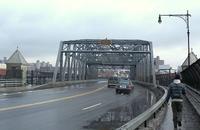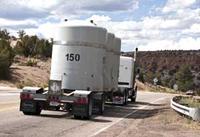-
Analyzing the sound of rain falling on a bridge reveals bridge’s health, stability

Engineers have found that by listening to how a highway bridge sings in the rain, they can determine serious flaws in the structure; employing a method called impact-echo testing, engineers can diagnose the health of a bridge’s deck based on the acoustic footprint produced by a little bit of water
-
-
Cybersecurity bill supporters want a vote on bill in this Congress
Last week, lawmakers and top White House officials appeared in different events, conferences, and industry gatherings to promote the cyber security bill which has been stalled in the Senate since August; administration’s officials and lawmakers supporting the bill warned that the current situation leaves U.S. critical infrastructure and businesses vulnerable to attack from hackers and spies
-
-
Twenty-year anniversary of U.S. last full-scale nuclear test
The first U.S. nuclear test, code named Trinity, took place in southern New Mexico forty-seven years earlier, on 16 July 1945; in all, the United States conducted 1,030 nuclear tests – the last one, code-named Divider, took place twenty years ago, on 23 September 1992
-
-
Los Alamos lab accelerates shipment of nuclear waste to permanent storage site

Los Alamos National Laboratory broke its own records in the first year of accelerated shipping effort of nuclear waste from the Lab to permanent disposal facilities located twenty-six miles outside of Carlsbad, New Mexico
-
-
Cosmic rays help gather information from inside the Fukushima nuclear reactors
Researchers have devised a method to use cosmic rays to gather detailed information from inside the damaged cores of the Fukushima Daiichi nuclear reactors which were heavily damaged in March 2011 by a tsunami that followed a great earthquake
-
-
A Mississippi river diversion helped build Louisiana wetlands
The extensive system of levees along the Mississippi River has done much to prevent devastating floods in riverside communities; the levees, however, have also contributed to the loss of Louisiana’s wetlands; by holding in floodwaters, they prevent sediment from flowing into the watershed and rebuilding marshes, which are compacting under their own weight and losing ground to sea-level rise
-
-
Corps: absolute flood protection along the Missouri River is impossible
A U.S. Army Corps of Engineers report said that absolute flood protection along the Missouri River is impossible, so the basin needs to prepare and plan for flooding in the future
-
-
Ozone causes forests to use more water, reducing availability in the Southeast

Scientists have found that rising levels of ozone, a greenhouse gas, may amplify the impacts of higher temperatures and reduce streamflow from forests to rivers, streams, and other water bodies; such effects could potentially reduce water supplies available to support forest ecosystems and people in the southeastern United States
-
-
Sen. Rockefeller asks Fortune 500 CEOs for cybersecurity best practices

Last month, Senator Jay Rockefeller (D-West Virginia) sent a letter to the CEOs of fortune 500 companies asking them what cybersecurity practices they have adopted, how these practices were adopted, who developed them, and when they were developed; many saw Rockefeller’s letter as an admission that the Obama administration does not have a basis for trying to impose cybersecurity practices on the private sector through the Cybersecurity Act of 2012, now stalled in Congress
-
-
More companies adopt cloud disaster recovery solutions

More and more companies adopt a cloud disaster recovery solution; in a recent 2012 TechTarget Cloud Pulse survey, a majority of the 926 companies that responded have said they are now using a cloud disaster recovery system or plan to in the next six months
-
-
Scientists say it is too late to stop global warming: better to focus on adaptation, mitigation
Two scientists argue that governments and institutions should focus on developing adaption policies to address and mitigate against the negative impact of global warming, rather than putting the emphasis on carbon trading and capping greenhouse-gas emissions; they say that attempts to limit greenhouse-gas emissions through carbon cap-and-trade schemes and to promote renewable and sustainable energy sources are probably too late to arrest the inevitable trend of global warming
-
-
States may join feds in regulating infrastructure cybersecurity
Dealing with cybersecurity issues relating to U.S. inmfrastructure has largely been a federal responsibility, carried out through the North American Electric Reliability Corporation Critical Infrastructure Requirements (NERC-CIP)’ the limitations of these requirements have led state regulators to consider increasing state role in infrastructure protection
-
-
Rehabilitating historical structures using laser scanning technology
The Carmel Mission Basilica in California is undergoing a restoration using cutting-edge laser scanning technology; earlier this year, engineers the from Blach Construction Company teamed up with CyArk, a non-profit foundation that digitally preserves historical sites, to shoot laser beams at and within the basilica to create precise digital maps of the building from different angles
-
-
U.S. energy policy should emphasize supply security, not energy independence
America’s policymakers need to consider whether energy independence is really necessary to achieve adequate, reliable and affordable energy supplies, according to a new report from Deloitte; the United States already enjoys significant energy independence for most sectors and much of our economy
-
-
Water level gauges failed during Hurricane Isaac
As Hurricane Isaac beat down on New Orleans, the damage it caused was nowhere near as severe as that of Katrina, but it lasted longer than most people expected and for the U.S. Army Corps of Engineers, it provided a field test of a multi-billion dollar investment in flood protection
-
More headlines
The long view
Helping Strengthen America’s Critical Infrastructure
By Corinne Dionisio
Everyday life depends on a robust infrastructure network that provides access to running water, communications technology and electricity, among other basic necessities. The experts who keep our national infrastructure secure and resilient also need a strong network to share their knowledge and train the next generation of professionals capable of solving complex infrastructure challenges.
AI and the Future of the U.S. Electric Grid
By Doug Irving
Despite its age, the U.S. electric grid remains one of the great workhorses of modern life. Whether it can maintain that performance over the next few years may determine how well the U.S. competes in an AI-driven world.
Using Liquid Air for Grid-Scale Energy Storage
By Nancy W. Stauffer
New research finds liquid air energy storage could be the lowest-cost option for ensuring a continuous power supply on a future grid dominated by carbon-free but intermittent sources of electricity.
Enhanced Geothermal Systems: A Promising Source of Round-the-Clock Energy
By Julie Bobyock and Christina Procopiou
With its capacity to provide 24/7 power, many are warming up to the prospect of geothermal energy. Scientists are currently working to advance human-made reservoirs in Earth’s deep subsurface to stimulate the activity that exists within natural geothermal systems.
Experts Discuss Geothermal Potential
By Graeme Beardsmore and Rachel Webster, University of Melbourne
Geothermal energy harnesses the heat from within Earth—the term comes from the Greek words geo (earth) and therme (heat). It is an energy source that has the potential to power all our energy needs for billions of years.
